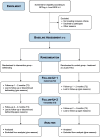BEFRIENding for Depression, Anxiety and Social support in older adults living in Australian residential aged care facilities (BEFRIENDAS): randomised controlled trial protocol
- PMID: 33980168
- PMCID: PMC8115389
- DOI: 10.1186/s12877-021-02233-7
BEFRIENding for Depression, Anxiety and Social support in older adults living in Australian residential aged care facilities (BEFRIENDAS): randomised controlled trial protocol
Erratum in
-
Correction: BEFRIENding for depression, anxiety and social support in older adults living in Australian residential aged care facilities (BEFRIENDAS): randomised controlled trial protocol.BMC Geriatr. 2025 Jul 15;25(1):529. doi: 10.1186/s12877-025-06181-4. BMC Geriatr. 2025. PMID: 40665207 Free PMC article. No abstract available.
Abstract
Background: This protocol describes an ongoing study of the impact of befriending on depression, anxiety and loneliness in older people living in residential aged care facilities in Australia. While systematic reviews of befriending have indicated positive benefits of befriending for people in a range of ages and settings, there have been no randomised controlled trials (RCTs) of befriending for older people living in residential aged care with depression and no studies of the cost effectiveness of befriending in residential aged care facilities (RACFs) in Australia.
Methods and analysis: We are conducting a single blind pragmatic RCT comparing two groups of older people living in RACFs, one receiving an intervention consisting of weekly befriending for 4 months from a trained volunteer and the other receiving treatment as usual. Participants undergo eligibility screening for depression (GDS-15 ≥ 4) and cognitive impairment (GPCog ≥ 4) and assessments at three measurement time points: baseline prior to randomisation, 2 months post-baseline and 4 months post-baseline. The primary outcome measure is depression, and secondary outcome measures are anxiety, loneliness, social isolation and quality of life. The economic evaluation will take the form of a cost-utility analysis based on the outcome of quality of life. The primary and secondary outcomes will be analysed using negative binomial and logistic regressions utilizing the Generalised Estimating Equations approach.
Discussion: To our knowledge, this is the first RCT evaluating the effectiveness of befriending on older people with depression living in residential aged care. It is expected that the befriending intervention will reduce the severity of depression symptoms experienced by older people living in residential aged care. If the intervention proves effective it may be incorporated into volunteer training programs and adopted as a way of supporting older people's mental health.
Trial registration: Trial registered with the Australian and New Zealand Clinical Trial Registry (ANZCTR) Number: ACTRN12619000676112 , registered 06/05/2019 - retrospectively registered.
Keywords: Anxiety; Befriending; Depression; Loneliness; Volunteers.
Conflict of interest statement
The authors declare that they have no competing interests.
Figures
References
-
- Australian Institute of Health and Welfare. Depression in residential aged care 2008–2012. Aged care statistics series no. 39 cat. No. AGE 73. Canberra: AIHW; 2013.
-
- Amare AT, Caughey GE, Whitehead C, Lang CE, Bray SC, Corlis M, et al. The prevalence, trends and determinants of mental health disorders in older Australians living in permanent residential aged care: implications for policy and quality of aged care services. Aust N Z J Psychiatry. 2020;54(12):1200–11. 10.1177/0004867420945367. - PubMed
Publication types
MeSH terms
LinkOut - more resources
Full Text Sources
Other Literature Sources
Medical



